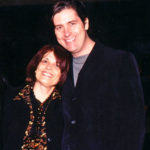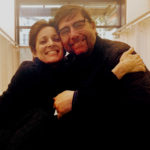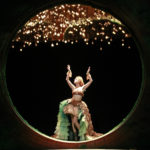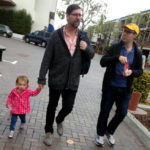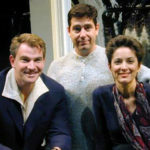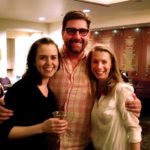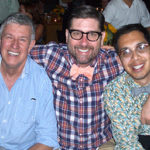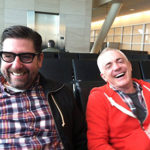MARK RUCKER'S CURTAIN CALL | MISCELLANY
I | II | III | IV
'You found yourself utterly disarmed – open, unfettered, and believing you could: you can go there, you can be that, you can wear that (or not wear it), you can sing that, you can dance that. And not only can you dance it, you can tap dance it.'
– Susannah Schulman
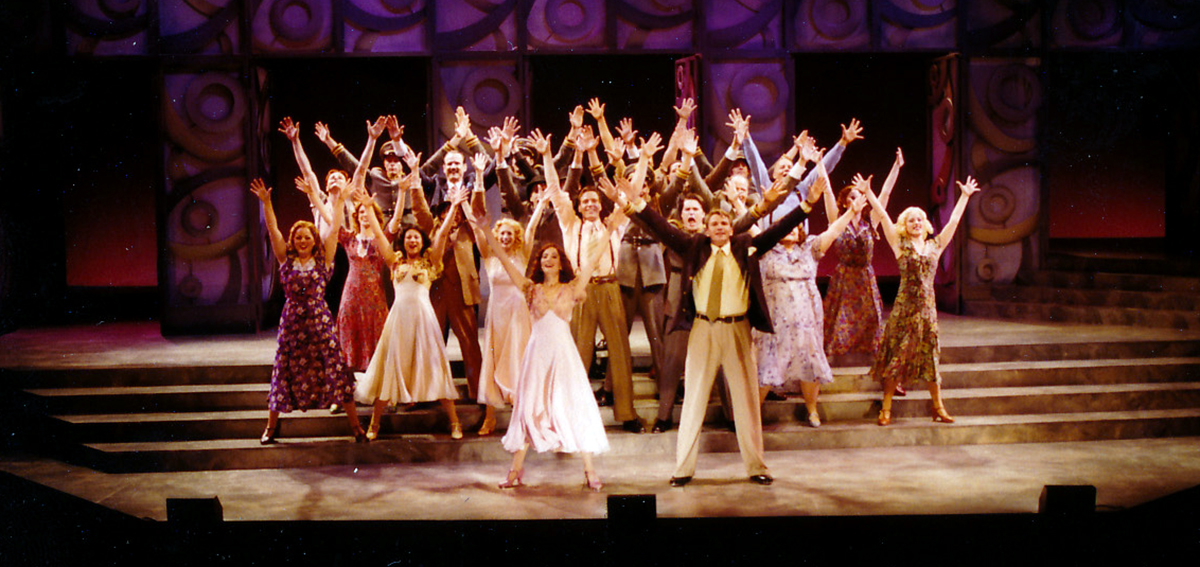
Click thumbnails to view full size images.
'ABSOLUTELY MY FAVORITE'
Cindy Katz – Actor. Appeared in Rucker's student Kingdom of Heaven at Yale School of Drama and again in a Yale Rep production. Played Kate in his Taming of the Shrew at SCR
He was absolutely my favorite director and my reason why was because he had incredible vision and would incredibly open like no other director. And the combination sounds impossible, but that's what he was able to do. … You can say looking at all of the productions there was a major stylistic imprint on these things but never at the expense of story and never at the expense of what an actor needs to feel comfortable with. So the whole Rat Pack dialect that everybody threw on top of it. And he was so capable of molding and shaping and totally putting his creative mark all over it, but somewhat spawned in the room, and you know that, that an artist in a room when you can feel free to just vomit up stuff and trust someone enough to be edited, Yeah. It was like the most fun I ever had.
'HE JUST WANTS IT REAL'
Joanne DeNaut – South Coast Repertory Casting Director
The problem we were having casting The Taming of the Shrew was finding someone to play the Don. Mark wanted something of a Don Corleone or Brooklyn Mafia type but not exactly that. He would know when he saw it. Then I thought, Doug Rowe could do this, but Doug never did Shakespeare. He just refused. I remember calling him and he said, "I … don't … do … Shakespeare!" I said, "No, it’s not that kind of Shakespeare; he just wants it real so just be you. Trust me. He is a genius." So he came in on a Saturday to audition with just Mark and me. And when he walked in the front door he said, "I don't know how the hell you got talked me into this." But Mark made him feel so relaxed. He didn't have to do anything. He said the words and there was the quality he was after. It was done. Doug said, "What an audition." Then he had such a good time in that show, and it all worked so magically, that he said "I'm not afraid of this anymore" and before long he was part of the Oregon Shakespeare Festival company.
Pictured, Joanne DeNaut and Mark Rucker.
PLAY WITHIN PLAY
Catherine Sheehy – Rucker's dramaturg at Yale School of Drama, Shakespeare Santa Cruz (post 1992), and others
He had a love of the classic Hollywood, the '30s through the '50s: those rich colors. He had that sort of sensibility: loved those classic women's pictures, the tearjerkers, the big stars. And, his Shakespeare brought those things together. His notion of how to make it accessible was to bring it closer to what we know.
One of my favorite Mark stories, which I tell my students about, was when we were doing Damn Yankees at Shakespeare Santa Cruz. I had some notes for him that I knew he didn't want to hear. But we were doing it in the round on a Mark Wendelind set in the indoor theater. Kevin Adams was doing the lights and I had some stuff I wanted to talk to Mark about and he was chatting with Kevin and I walked towards them and Mark moved Kevin further around the set. So I'd walk closer towards him and he'd move them away again. It became a play within the play, just chasing him all the way around the theater in the round. I could tell he didn't want the notes because of all the stuff he was dealing with. Usually with us we'd go over the notes over a cup of coffee or a drink and talk and we would sit together and a lot of it would be fairly intuitive and we'd know what each other was thinking, you know?
'HE EXUDED CURIOSITY'
Nike Doukas – Actor. First worked with Rucker in 1991 on Our Town at Shakespeare Santa Cruz. His 1992 staging of Loot introduced her to South Coast Repertory, where her many credits include his Much Ado About Nothing, in 2001, as Beatrice.
Mark wasn't afraid to not know all the answers, and to let rehearsals be messy for a while. In the end, his hand was always sure and meticulous, but he also loved the part of rehearsal where you live in all the possibility. And one other thing: as an actor, you always felt his eyes on you, in the best possible way. He exuded curiosity and love and support; always he was intently watching yet trusting you, knowing you and he would find the way together. It made the process feel so safe and free, all at once.
Pictured, Nike Doukas and Mark Rucker, San Francisco, Spring 2015. Photo by Leo Marks
THE WALK-DOWN
Art Manke – Director/Choreographer, worked on the tap dance finale for Rucker's Much Ado About Nothing at SCR in 2001. Trained at ACT.
Bill Ball was known for big spectacular curtain calls. And at the end of the season, back when it was true repertory, with up to 12 productions in a season – the first had season 23 productions in repertory! – the final, final performance had what was called a walk-down. It went on for ten, 15 minutes, with a curtain call representing each of the productions. The actors were frantically backstage changing into the next play that was being bowed and it just went on and on and on.
'HIS WAY WAS SO INVITING'
Susannah Schulman Rogers – Actor, in 15 productions over two decades, from Macbeth
at Shakespeare Santa Cruz in 1992 to A Midsummer Night's Dream at South Coast Repertory in 2011
As an actor, if you found yourself in a play directed by Mark Rucker, the odds are pretty good that you found yourself "Nearly Naked." I mostly mean this figuratively, in that you would find yourself stripped: Stripped of your armor, stripped of your fear, stripped of your ego, stripped of the outside eye that tells you that you're not enough – not this enough, not that enough, that you can't be this, or do that, that you're not brave enough. You would be stripped of these things because Mark's style, his bedside manner, his way was so inviting, so persuasive, and so disarming, that you found yourself utterly disarmed – open, unfettered, and believing you could: you can go there, you can be that, you can wear that (or not wear it), you can sing that, you can dance that. And not only can you dance it, you can tap dance it.
Pictured, Susannah Schulman as Titania in Rucker's final SCR production, A Midsummer Night's Dream, in 2011
'WE WERE IN COMPLETE SYNC'
Charles Busch – screenwriter and star of Die Mommie Die!, directed by Mark Rucker
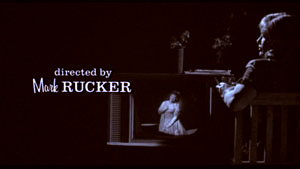
[Die Mommie Die] was one of the last indie films shot on film. Mark was just so sympathetic and gentle and yet very much in control of the whole situation. He had really done his homework and knew the movies that we were parodying. Everybody on the film did their homework. They all knew that you had to for a parody to work. A lot of people don't.
It was so organized and we were in complete sync about everything. What was amazing to me on this little low-budget movie was that we actually shot more footage than was planned. In my experience it's usually the opposite, because you have to move so fast to do a movie in 21 days. We would shoot a lot of scenes three ways. We would do the first take where I would be very, very, very minimalist movie acting. We called that the Liv Ullman shot. Then we'd do slightly bigger and finally we'd go for what we called the Martha Raye shot: real big and kind of camp. It was a little scary, because my performance then was completely in his hands. And I thought he did me proud.
It was so hard when it was over. It's really almost the only time in my life that I felt that way because I sort of have always protected myself emotionally with a kind of cool … I don't get myself too worked up. Those 21 days were so magical for me.
Pictured, Rucker's credit in Die Mommie Die!
'THE HUB OF AN ARTISTIC FAMILY'
Amy Freed – playwright, Freedomland, The Monster Builder, and The Beard of Avon, which Rucker directed in its first in-house SCR reading and its 2002 ACT production
My first memory of him was of this absolutely positive and supportive, interested, being. There was an immediate charm and sweetness and vitality about him. There was a sense of a community, the hub of an artistic family around him. He was a bit of a flame for all us moths in the field. Because he was a like-minded spirit and a welcoming essence without a sense of hierarchy, he was a person who you came to to talk about stuff, to offer ideas. He was very, very open artistically and you felt the width of his parameters.
There are two ways to approach a new piece of work. One is to reveal the intention of the text and illuminate it and the other is to do something so striking and signature with your production that it takes focus. And those will be in conflict. Looking to make your mark with a production is not the same as creating the most representative space to truly illuminate a writer's new work. Mark didn't suffer from that. He was able to do both things.
'COLLABORATIVE, GENEROUS'
Annie Weisman Macomber – playwright Hold Please
I felt really grateful to work with him because he never approached the play like it was broken. A lot of times a new play director acts like sort of a doctor and the play's sick and they're going to fix your play, and heal it. And he just sort of approached it like it was this imperfect perfect thing, the way you approach Shakespeare. And I loved that. A writer loves that. You love feeling like he was just sort of figuring it out. But it was clever, because he would ask … his inquiry into the play, into the corners of the play that were messier or less finished kind of helped you discover where you needed to do the work and fix things. It was very clever and interesting and you know, and a collaborative generous way to work.
Pictured, Dorothy Macomber, Mark Rucker, and Bill Macomber. Photo by Annie Weisman Macomber
'GOOD TO ME'
Reg Rogers – Actor; Yale School of Drama, Acting, Class of 1993
He was very kind to me for a guy who really didn't understand why I was at Yale. I'd gone because somebody told me I should. I had no idea what it was, what graduate school entailed. I didn't even know that I necessarily wanted to be an actor, but somebody said you should be an actor and you should go to a grad school. … But Mark knew exactly why he was there. And he sort of set me straight in a lot of ways, but mainly that, if you're doing it, fuckin' do it. Don't mess around. And don't think it's something more than it is. Yes there's art, but it's a thing you do because you love it. So do it. And don't think that anybody owes you anything. Just do what you do and the rest, whatever follows, is what follows.
'IN HIS ELEMENT'
Douglas Sills – actor, Benedict in SCR's Much Ado About Nothing
I have a real strong memory of working out a sequence with him where somebody was having archery practice and Benedict was weaving in and out of the targets trying to overhear people talking about him. We rehearsed it over and over to try and make it both safe and scary. And I was trying my best to essentially become Danny Kaye, hanging from the rafters and dodging arrows. We obviously had to make it very safe, but look dangerous. And Mark was just in his element. He was gleeful. He loved the whole idea of somebody shooting live arrows at another actor on stage as he wants to both run away from the arrows and stay close enough to hear what's being said about him. It was a great thing for him and I think the curtain call had that same sort madcap effervescence.
Pictured, Douglas Sills, Mark Rucker and Nike Doukas, photo for newspaper, during rehearsals for Much Ado About Nothing at SCR, 2001
'I TRUSTED HIM IMPLICITLY'
Julia Coffey – actor, Hero in SCR's Much Ado About Nothing, Mae in ACT's Once in a Lifetime,
Rosalind in As You Like It to launch Santa Cruz Shakespeare
Honestly, Once in a Lifetime was Mark at one of his best. It's a huge show with a large cast and a sprawling story. My part was substantial, but I remember thinking during rehearsals how I felt so free and creative and unrushed and how much fun I was having. That was Mark. He never made you feel like you had to rush the discovery process as an actor and he gave you access to the full canvas to explore. Another of his gifts as a director was the ability to see the seed of an instinct in you and encourage its growth. I trusted him implicitly. He saw you, he saw the character in you and shaping the world of the play felt truly owned and yet collaborative. Working with him on that show was a milestone for me, because it was the first time as a professional leading lady that I was able to tap into a confidence, a real trust in myself that would serve me in every rehearsal room thereafter.
Pictured, Emily Donahoe, Mark Rucker and Julia Coffey toast the closing of ACT's Maple and Vine.
'HE WAS TRULY LOVED'
Michael Edwards – At UCLA with Rucker 1979-1982, Artistic Director Shakespeare Santa Cruz 1986-92,
currently Artistic Director of Asolo Repertory Theatre in Sarasota, Florida
There's a really interesting overlapping circle. Catherine Sheehy got her first job as a dramaturg at Shakespeare Santa Cruz with me. And she goes on to head the graduate program dramaturgy at Yale, one of the most important dramaturgs in the country. And Mark ended up going to Yale. I think of us in the '80s as this extraordinary of crucible of artists drawn together, doing these really adventurous productions of Shakespeare at a time when they were not being done in the rest of the country. • • • Just to know that he was truly loved. He was truly loved. And I think in straight life, this is easily acknowledged. And I think one of the concerns I have in talking about him, is if the relationships aren't mentioned, it seems like he lived a lonely life. And the opposite is the case. He led a life rich in friendship and love and deep, deep connections with many people. He was a fully actualized man and I was, I feel, a part of that. We met when he was around 21. So, he's my oldest friend in America. It's hard for me not to talk about him in the present tense.
Pictured, Michael Edwards, Mark Rucker and Edward Pelayo, October 2011
'HE WOULD HAVE BEEN TICKLED'
Patrick Stretch – Friends since UCLA, 1980
I would say there was a celebratory mood at the end of the ceremony because we felt like we'd sent him off properly, and pulled off this somewhat ambitious show. And it felt very gratifying that we'd all come together in this way to say thank you to Mark for what he'd given us. And, give something back. So, there was relief, because it was really a painful thing. But there was relief that we had done it, and we had done it well. And I feel like, if this is possible, that the ceremony in New York sort of invoked his presence. It's something that he would have hated because it was all about him. But it's also something he would have been tickled by.
Pictured, Mark Rucker and Patrick Stretch, New York, 2014
'WITNESS TO MY LIFE'
Danny Scheie – Actor. Former Artistic Director of Shakespeare Santa Cruz. Among Rucker's closest friends for 30 years.
I feel good that the last show that he touched, a project he really loved, was House Tour and that it turned into such a hit. Even though Jason Eagan – who I love – came on to direct, as far as my performance, Mark's contribution is still in it. He gave me an incredible amount of confidence. He and Peter and I had worked on the play a lot, with Peter rewriting every day during the Ground Floor workshop. I've never been in a play that sold out in 24 hours and every time they added a performance it would sell out in an hour. I feel really good that Mark contributed so much. • • • He loved watching old movies, the good and the bad and the weird and we used to curate these film festivals that were just a crazy mix-up of movies. We did this with all sorts of people, all over the place, but Amy's house was great because you have a major film critic [ 49 ] there and there's a pull-down screen. It was really fun. • • • Mark was a huge part of my life. One of the things I said when he died was that he was really like this witness to my life in a way. But now that he's gone, in a sort of existential way, it's not verifiable that it happened anymore. We talked on the phone like every day for years and years. It was really fantastic.
Pictured, Mark Rucker and Danny Scheie, San Francisco, 2014
AUDIO AND VIDEO
'Marcus, or the Secret of Sweet' | Open Book, 'Cover to Cover' (2010)
• • •
'Once in a Lifetime' | Stark Insider (2012)
• • •
'Die Mommie Die!' | DVD Extra (2003)
Mark Rucker, Charles Busch and Jason Priestly join in a commentary track available on the DVD – a must for Ruckerphiles. Available through NETFLIX DVD rentals.
CRITICS | ACADEMICS
Evelyn Gajowski, The Art of Loving: Female Subjectivity and Male Discursive Traditions in
My most recent experience of Romeo and Juliet in the theater – the 1989 Shakespeare/Santa Cruz production – bears out the irrelevance of the providential view. During the 140 lines that follow the deaths of the lovers, the audience is not even listening. Rather they are staring at the two fresh corpses in the Capulet vault. All that matters is that Romeo and Juliet are dead. In this production's staging of the closing scene, Juliet's body remained on the upper stage, spotlit, dominating the surrounding action from the close of the potion scene, throughout the lamentations scene, and the first half of the vault scene. Characters I the lamentations scene transformed the wedding bed into a crypt. After Romeo's death both bodies dominated the stage throughout the last 140 lines of 53. The theatrical effect that was gain by such a dramaturgical decision was rich and complex, far more so than merely emblematizing the light and dark imagery in the language of the play. It emphasized, instead, the deaths of the lovers and de-emphasized the restitution of social harmony so cherished by the divine providence critics of the 1950s. All the other characters, in fact, were literally in the dark during 5.3. This decision – like "the tragic loading of this bed" in Othello – emphasized the visual image of the bodies of the lovers locked in the dead embrace of the tomb as against that of the lovers locked in the living embrace of their wedding bed in 3.5. Powerfully lodged in the final image of the lovers' destruction, then, was the image of their potentiality, the earlier stage image showing through the final one.


